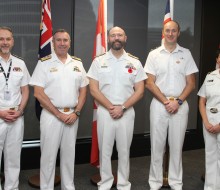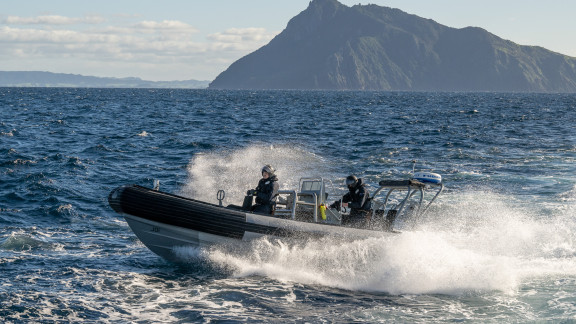
Five Eyes strategic navy talks conclude in Wellington
14 November 2025
Unfortunately you are viewing this website on an outdated browser which does not support the necessary features for us to provide an adequate experience. Please switch to a modern browser such as latest version of Google Chrome, Mozilla Firefox, Apple Safari or Microsoft Edge.
Ngā mihi nui
Inshore Patrol Vessel HMNZS Taupo has helped ensure fisheries compliance amongst the northern fishing fleet in a sustained boarding operation last month.
For three weeks, HMNZS Taupo patrolled from North Cape to East Cape, hailing commercial fishing vessels and getting Fisheries New Zealand Fishery Officers on board to conduct checks.
Lieutenant Commander Toby Mara, Taupo’s Commanding Officer, estimated they covered the bulk of the northern fishing fleet, with 26 boardings undertaken.
The Fishery Officers were checking the fishing vessels’ electronic reporting, paperwork and fishing practices. Pleasingly, a high degree of compliance was found.
LTCDR Mara says they rotated two fisheries officers in each week.
“It’s not always achievable for Fishery Officers to get to vessels off the coast, so this is where the Navy can help in getting them on board.”
Fisheries New Zealand Director of Fisheries Compliance Steve Ham agrees.
“Working with our partners at NZDF in a joint operation provides us greater capacity to inspect commercial fishing vessel operations at sea,” Steve Ham says.
“This vital work enables us to gain a greater picture of fishing operations outside of territorial limits which we could not do without our support from NZDF.”

Checking on domestic fisheries fleet | Royal New Zealand Navy
Each day’s routine would start with a briefing on the bridge, with the Fisheries New Zealand Fishery Officers displaying their operating picture. Fishing vessels must report their location regularly, says LTCDR Mara.
“We then hail the vessel by radio, but if they’re all on deck they may not respond immediately. If we don’t get a response, we’ll check with MPI about previous interactions, then go to boarding stations. The inspectors and our boarding party will go across in a RHIB and request to board.”
He says the response from the crews is generally good. “This time, the vessels were generally compliant in their practice. There were a few minor issues, but nothing significant was found.”
As well as the three-week operation, Taupo has training obligations for officers and sailors and is one of the fleet’s busiest ships.
The ship cut short its schedule in the Bay of Plenty to avoid bad weather, expected swells to pick up to around the 4-metre mark. LTCDR Mara said that while the ship avoided the worst of it, the transit back north to Auckland was still rough.
“The crew is well prepared for it,” he says. “What can get to people is the confined living, with shared cabins and a small amount of space. We often go into a port for a weekend, with the crew proceeding ashore for activities and a look-around.”
He says he’s pleased with their latest time at sea. “After two days settling in, it went really smoothly. We’ll spend a week alongside in Auckland, prior to getting back out there and continuing with our programme.”
“An Inshore Patrol Vessel’s programme can be pretty relentless, and we keep our bunks fill with sailors and officers who need sea training. A lot of people don’t realise how busy we can be.”